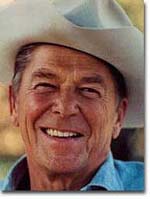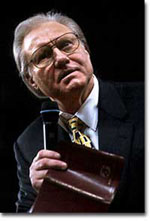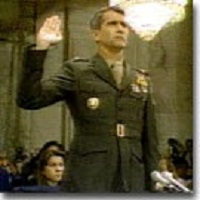
59. The Reagan Years

Ronald Reagan swept into office in 1980 with a sizeable victory over incumbent Jimmy Carter. Tax cuts and military spending were the hallmark of his administration.
Americans were fed up.
In 1980, confidence in the American economy and government hit rock bottom. Looking for a change and the promise of a better future, voters turned to Ronald Reagan for answers.
His message was clear. Government has become too big and needs to be trimmed down to size. Taxes are insanely high and need to be cut to stimulate growth and investment. Military spending should be increased to fix the degenerating state of the American war machine. Morality and character need to be reemphasized in American life. The United States is still the largest superpower in the world with the best system of government. It's time to feel good about being an American again.

Before the news of his involvement in a tawdry sex-scandal broke, Jimmy Swaggert had been one of America's most popular televangelists. In 1986, the last full year before the scandal, his television ministry raised nearly $142 million dollars.
Reagan's election brought a dramatic change to the federal government. No president, Republican or Democrat, had attempted to reduce the size of the federal government since Franklin Roosevelt initiated his New Deal. The tax cut that was handed to the American people benefited wealthy Americans most, with the hope that their increased income would trickle down to poorer Americans — the so-called trickle-down theory. The economic stagnation of the 1970s did come to an end, but at the cost of huge federal deficits and the increasing poverty rate.
The 1980s were a decade of scandals. The Iran-Contra Scandal proved that White House officials were willing to break the law to carry out their political agenda. Religious leaders like Jim Bakker and Jimmy Swaggert became mired in dirty sex scandals. Moral turpitude ended the political career of Colorado Democrat Gary Hart, who might well have been president one day. A savings and loan scam fleeced American taxpayers for billions and billions of bailout dollars.

The Iran-Contra scandal featured top government officials selling arms to Iran and using the profits to back guerillas in Nicaragua. Oliver North, seen here testifying before the Iran-Contra committee, was the chief negotiator of these deals.
American lifestyles changed dramatically during the 1980s. Cable television introduced a whole palette of new programming for the discriminating viewer. Compact discs replaced records as the most popular medium for recorded music. Banking became more convenient with the proliferation of automatic teller machines. Businesses and individuals rushed to purchase personal computers that held the promise of radically simplifying difficult tasks.
As the decade came to a close, it became clear that the malaise of the 1970s was over. The United States received a boost of confidence when the Cold War came to an end in 1991. The menace of a threatening Soviet Union now belonged to history, and the United States claimed the status of the only remaining superpower in the world.





